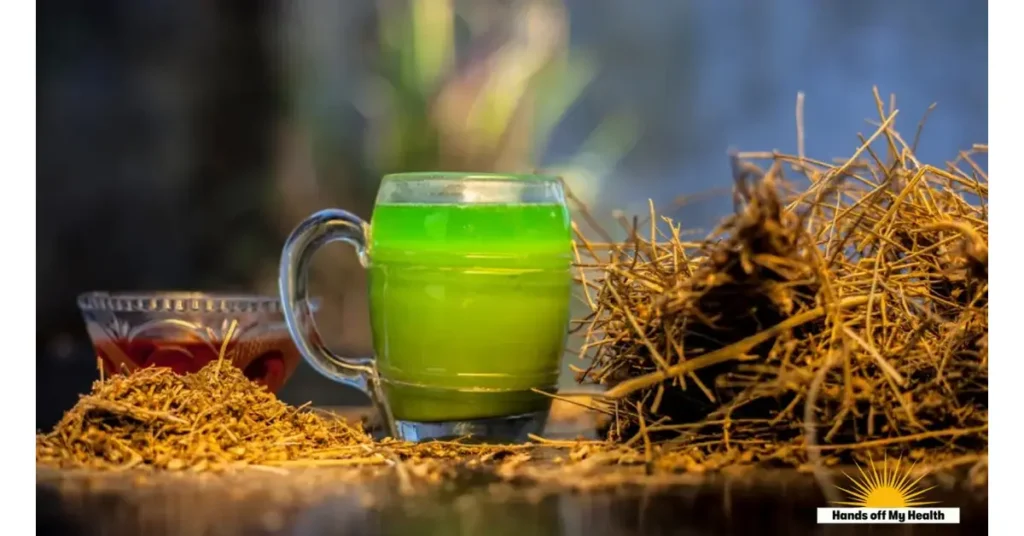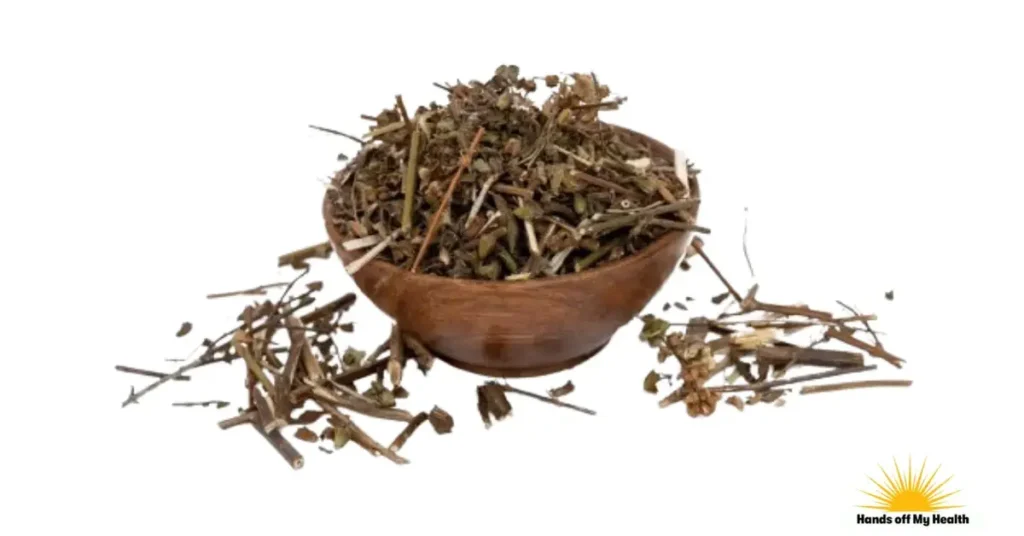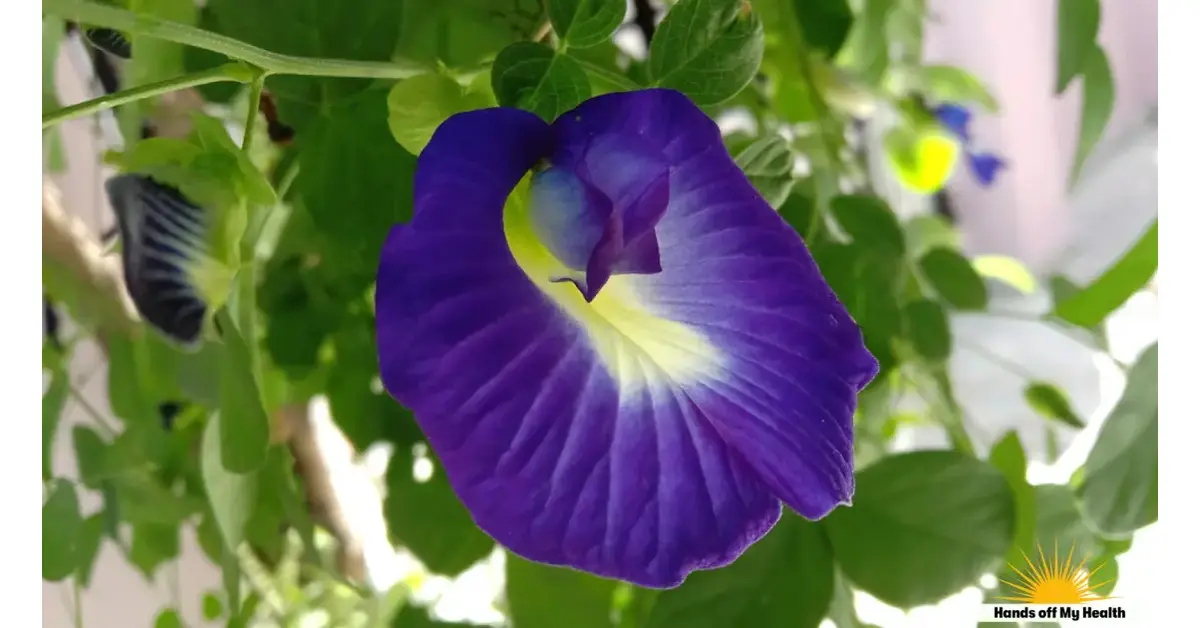Do you want to boost your memory and concentration naturally? Have you ever heard of Shankhpushpi, the ancient Ayurvedic herb for brain health?
Shankhpushpi is also known by its scientific name clitoria ternatea. Clitoria ternatea is a plant with conch-shaped flowers. In Ayurveda, people have used it for various health benefits. You can use any part of the Shankhpushpi plant – such as the leaves, flowers, stems, roots, or seeds – in different ways. For example, you can make a paste, powder, syrup, or tonic from the plant.
Packed with a wide range of active ingredients in Clitoria ternatea, including alkaloids like shankhapushpine, convolvuline, convolidine, convolvine, convolamine, convoline, confoline, and convozine, makes it a powerhouse of health benefits.
Shankhpushpi benefits and uses

1. Shankhpushpi benefits for brain
- Boosts Intellect and Memory: Shankhpushpi, recognized as “Medhya Rasayana” in Ayurveda, enhances intellect and memory.
- Enhances Concentration and Learning: Active components like convolidine, convolvine, and confoline protect the brain and boost concentration and learning.
- Reduces Mental Fatigue: Shankhpushpi combats fatigue, keeping the mind alert.
- Reduces Stress and Anxiety: Its calming effect contributes to mental well-being.
- Potential for ADHD Management: Some evidence suggests it may help manage ADHD symptoms.
Tips of Using Shankhpushpi to Improves cognitive functioning
- Combination with Brahmi: Mix 1/2 tsp of Shankhpushpi and 1/2 tsp of Brahmi with honey in warm milk, taken twice daily for better cognitive enhancement.
- Tablets and Capsules: These forms are also used for improving brain functions.
2. Reduces Mental fatigue
Shankhpushpi, a commonly used herb in Ayurveda, offers several benefits related to mental well-being. It is known for its Vata-balancing and Medhya properties.
Here’s how it contributes to reducing mental fatigue:
- Relaxation: Shankhpushpi aids in relaxation, calming the mind and reducing mental strain.
- Stress and Anxiety Reduction: It helps relieve stress and anxiety, promoting mental well-being.
- Enhanced Cognitive Abilities: Shankhpushpi is a brain tonic that helps in better focus, concentration, and cognitive functions.
- Improved Sleep Quality: By inducing relaxation, it contributes to better sleep quality.
Tips of Using Shankhpushpi for Mental Fatigue:
- Consuming Shankhpushpi syrup or juice before sleep can benefit those experiencing insomnia or sleep disturbances.
3. Enhances cardiac functioning
- Antioxidant Properties: Shankhpushpi contains antioxidants that neutralize harmful free radicals in the body. free radicals are molecules that can damage your cells. They cause oxidative stress, which is linked to heart problems. By scavenging free radicals, Shankhpushpi helps protect the heart from oxidative damage.
- Anti-Inflammatory Activities: Hypertension: Shankhpushpi may have hypotensive (blood pressure-lowering) effects, making it complementary for managing hypertension.
- Atherosclerosis: Its antioxidant and anti-inflammatory properties may slow down plaque buildup in arteries.
- Angina: Improved blood flow and reduced inflammation could relieve angina symptoms.
Tips for Using Shankhpushpi for Cardiac Functioning
- With Honey or Ghee: Mixing Shankhpushpi with honey or ghee enhances bioavailability and complements its cardiovascular benefits.
- Oil or Decoction: Use Shankhpushpi oil or decoction forms—topically or orally.
4. Stimulates digestion
- Laxative Effect: Shankhpushpi can promote regular bowel movements, helping manage constipation and improving digestive well-being.
- Anti-inflammatory Properties: It may soothe the digestive tract and alleviate symptoms of gastrointestinal disorders.
- Detoxification: Shankhpushpi aids in detoxification, eliminating toxins, supporting liver function, and improving digestive health.
- Gastroprotective Effects: Studies suggest Shankhpushpi may protect the gastrointestinal lining and reduce inflammation, benefiting conditions like dysentery and piles.
Here’s how it contributes to Digestion Stimulation
- Bloating and Gas: Shankhpushpi’s properties may reduce bloating and gas by promoting smooth digestion and minimizing inflammation.
- Acidity: Traditionally used to alleviate acidity, Shankhpushpi may help manage acidity-related symptoms.
- Loss of Appetite: Shankhpushpi may stimulate appetite and improve digestion.
Tips for Using Shankhpushpi to Stimulate Digestion
- With Ginger or Black Pepper: Enhance Shankhpushpi’s digestive benefits by combining it with ginger or black pepper.
- Powder or Tea: You can take Shankhpushpi as a powder or tea. It is easy and simple.
5. Prevents ageing
- Antioxidant Effects: Shankhpushpi has antioxidants that neutralize free radicals. These free radicals cause cell damage, including skin cells, due to environmental factors and aging. Shankhpushpi could help protect the skin from premature aging by preventing free radical damage.
- Rejuvenating Properties: Shankhpushpi is a herb that makes your skin look younger. It keeps your skin firm, stops it from drooping, and smooths out the lines.
- Support for Hair Health: Shankhpushpi benefits hair health by nourishing the scalp and hair follicles, which may prevent hair loss and promote hair.
- Anti–Inflammatory: Shankhpushpi has anti-inflammatory properties that may help manage inflammation, potentially relieving joint discomfort associated with signs of aging.
Here’s how it contributes to preventing aging:
- Skin Aging: Shankhpushpi is a herb that has many antioxidants. They protect your skin from damage and help make more collagen production, which keeps your skin firm.
- Hair health: Shankhpushpi may make your hair stronger and healthier, but there is not much research on this. People have used this herb for a long time for the benefit of hair health. Good hair is important for your health.
- Joint Health: Inflammation in the joints is common with aging. Shankhpushpi’s anti-inflammatory effects may aid in managing joint pain and stiffness.
Tips of Using Shankhpushpi for Anti-Aging:
- Topical Application: Mix Shankhpushpi with a carrier oil such as coconut or almond oil. Then, apply this mixture to your face or other wrinkle-prone areas. It functions as a natural anti-ageing serum.
- In Hair Care Products: Consider using hair care products containing Shankhpushpi, such as shampoos or hair oils. These products help nourish the scalp and promote healthier hair.
6. Heals wounds and acne
- Anti-Inflammatory Action: Shankhpushpi plant possesses anti-inflammatory properties that can help in healing wounds and acne. It lowers the swelling and redness that can delay healing. Shankhpushpi makes healing faster by reducing inflammation.
- Antimicrobial Effects: The herb can protect wounds and acne from getting infected. It kills harmful bacteria and fungi that cause skin problems. The herb is good for your skin because it has antimicrobial properties.
- Skin Regeneration: Shankhpushpi benefits the skin by regeneration of skin tissues and can treat skin conditions like cuts, burns, eczema, and psoriasis, where the skin’s natural barrier is damaged. Here’s how it Heals wounds and acne
- Wound Healing: Shankhpushpi is a plant that you can put on wounds and cuts. It is used in Ayurvedic medicine. It lowers swelling and redness and keeps away germs. Shankhpushpi helps your skin heal faster.
- Burns: Shankhpushpi can help manage burns, soothe burnt skin, and promote healing due to its soothing and healing properties.Eczema and Psoriasis: Shankhpushpi’s Ropan property helps with eczema and psoriasis by reducing inflammation and promoting skin regeneration.
Tips of Using Shankhpushpi for Healing Wounds and Acne:
- As a Paste or Poultice: Mix Shankhpushpi powder with water or aloe vera gel to create a paste. Apply the paste to wounds, cuts, or acne-prone areas, Leave it on for some time before washing it off. This method allows for direct application and absorption of the herb’s beneficial properties.
- In Lotions or Soaps: Consider using skincare products that contain Shankhpushpi, like lotions or soaps, to improve your skin health.
7. Boosts immunity
- Antibacterial Properties: Shankhpushpi has antibacterial properties that can stop bacteria from growing and spreading. This can help prevent bacterial infections and improve overall immune health.
- Antiviral Activities: Shankhpushpi is believed to possess antiviral properties, which can help prevent and manage viral infections. By specifically targeting viruses, it may bolster the body’s natural defence mechanisms against viral threats.
- Antifungal Activities: Shankhpushpi has antifungal properties that can help you fight fungal infections. This property also contributes to its overall immune-boosting potential.
- Allergies: Shankhpushpi’s immune-modulating properties may help alleviate symptoms of allergies by regulating the immune response. Allergic reactions involve an overactive immune response, and Shankhpushpi may help modulate this response.
- Asthma: Shankhpushpi possesses bronchodilator effects, which may help in managing asthma symptoms by improving respiratory function. This contributes to overall well-being and immune health.
Tips for Using Shankhpushpi for Immunity:
- Combine Shankhpushpi with immune-boosting ingredients like turmeric or honey. Turmeric has anti-inflammatory and antioxidant properties, while honey has antimicrobial effects. This combination may enhance the overall immune-boosting potential.
How to take various forms of Shankhpushpi and their recommended dosages
- Shankhpushpi Syrup or Arishtam:

- Easily consumable and often combined with other herbs for enhanced effects.
- Contains 200 mg of Shankhpushpi per 10 ml.
- Take 10 to 15 ml twice a day with water or milk or as directed by a physician.
2. Shankhpushpi Tablets/Capsules or Gutikas:
- Convenient for regular use.
- Available in precise doses.
- Swallow 1 to 2 tablets once or twice a day, preferably after meals, as advised by the doctor.
3. Shankhpushpi Powder or Churna:

- Mix ½ to 1 teaspoon of Shankhpushpi powder with lukewarm milk.
- Take it preferably in the morning to improve memory and concentration.
4. Shankhpushpi Juice or Kashayam:
- Mix 3 to 4 teaspoons of Shankhpushpi juice with one glass of water twice a day.
- It may help lower the chances of epilepsy.
5. Shankhpushpi Oil or Tailam:
- Massage the forehead and scalp with Shankhpushpi oil.
- It is believed to have a calming effect on the nervous system and promote relaxation.
Note: Choose the form that aligns best with your preferences and health requirements!
Potential side effects of shankhpushpi
- Gastrointestinal Discomfort:
- Some people may experience mild stomach upset, bloating, or gas after consuming Shankhpushpi.
- If you notice any digestive issues, consider adjusting the dosage or discontinuing use.
2. Allergic Reactions:
- Although rare, some individuals may be allergic to Shankhpushpi.
- Watch out for symptoms like skin rashes, itching, or difficulty breathing.
- Discontinue use immediately if you suspect an allergic reaction.
3. Drowsiness or Sedation:
- Shankhpushpi is known for its calming properties.
- While this can be beneficial for relaxation, excessive sedation may interfere with daily activities.
- Avoid operating heavy machinery or driving if you feel excessively drowsy.
4. Drug Interactions:
- Shankhpushpi may interact with certain medications.
- If you’re taking any prescription drugs, consult your doctor to ensure there are no adverse interactions.
5. Pregnancy and Breastfeeding:
- Limited data is available on Shankhpushpi’s safety during pregnancy and breastfeeding.
- Avoid it during in this period unless recommended by a healthcare provider.
Important Disclaimer: The information provided on this site is intended solely for educational and informational purposes. It is not meant to diagnose, treat, cure, or prevent any disease or condition. Always first consult with your doctor or another qualified healthcare provider before using any Ayurvedic products or following advice from this site.



